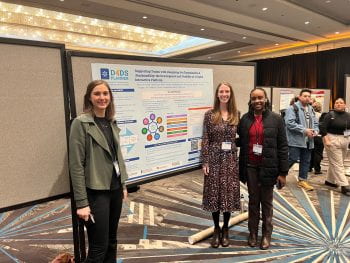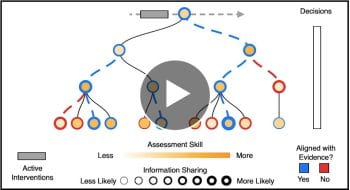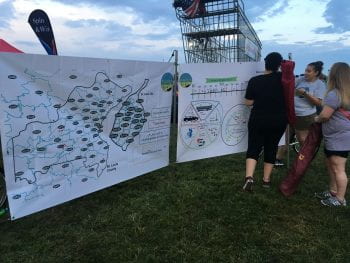News
Barriers and Facilitators to Program Sustainability Among State Tobacco Control Programs (Links to an external site)

Breaking Barriers: An Innovative Tool to Assess the National and City-Level Physical Activity Policy Development to Practice Disconnect

The study “Breaking Barriers: An Innovative Tool to Assess the National and City-Level Physical Activity Policy Development to Practice Disconnect” introduces a novel tool, INTEGRATE PA-Pol, designed to assess how national and subnational governments collaborate on physical activity promotion policies. This research focuses on understanding the development, implementation, and alignment of these policies between different […]
Sleep, Stress, and Cardiometabolic Health in Women of Childbearing Age with Overweight and Obesity (Links to an external site)

Student Spotlight: Masoomeh Faghankhani

Hometown: Tehran, IranUndergraduate school and major/minor: Tehran University of Medical Sciences/MedicineProgram at Brown: MPHAnticipated graduation date: May 2024Three things you have with you at all times: My smartphone, black tea bag, and antiseptic hygienic stuff What are your hobbies or activities when you aren’t studying or working?Trail jogging, Watching a wide array of films including […]
Welcome to our new PRC members
Drew Crenshaw (he/him) is a doctoral student working as a Research Assistant with Peg Allen on the Public Health Accreditation Board (PHAB) Accreditation Success Stories project. He grew up in Birmingham, Alabama, where he earned his Bachelor of Science in Public Health and Master of Public Health with a concentration in Environmental Health from the […]
The D4DS Planner has Officially Launched

The PRC’s Maura Kepper, Allison L’Hotta, Thembie Shato, and Ross Brownson, along with other collaborators, officially launched the new D4DS Planner at the 16th Annual Conference on the Science of Dissemination and Implementation in Health, held in Arlington Virginia December 10-13, 2023. The planner was a collaboration between researchers at Washington University in St. Louis, […]
Shaping Policy and Practice: Analyzing the Reach of Highly Cited and High Altmetrics Publications for Broader Impact on Physical Activity (Links to an external site)
Abstract Background: A significant gap remains between the availability of physical activity (PA) evidence-based interventions and their application in real-world settings in policy and practice areas. This study aims to describe highly cited and high altmetrics publications in PA research and explore their impact on PA policy and practice. Methods: Mixed-methods sequential explanatory study including the identification […]
Integrating a focus on health equity in implementation science: Case examples from the national cancer institute’s implementation science in cancer control centers (ISC3) network (Links to an external site)
Abstract Background: A Health Equity Task Force (HETF) of members from seven Centers funded by the National Cancer Institute’s (NCI) Implementation Science in Cancer Control Centers (ISC3) network sought to identify case examples of how Centers were applying a focus on health equity in implementation science to inform future research and capacity-building efforts. Methods: HETF members at […]
Advancing the Science and Application of Implementation Science to Promote Health Equity: Commentary on the Symposium (Links to an external site)
Abstract There has been an increasing focus on making health equity a more explicit and foundational aspect of the research being conducted in public health and implementation science. This commentary provides an overview of five reviews in this Annual Review of Public Health symposium on Implementation Science and Health Equity. These articles reflect on and advance the […]
PRC Faculty, Peg Allen and Maura Kepper receive new grants

Peg Allen recently received a new grant funded through the Public Health Accreditation Board, titled “Small Health Department Accreditation Success Stories.” The purpose of this short-term project (October 2023 through May 2024) is to develop public health department success stories for the Public Health Accreditation Board that describe facilitators of successful preparations for national accreditation […]
Staff Spotlight: Dixie Duncan

Dixie Duncan grew up in the town of Van Buren, MO, population 800, a dot on the map adjacent to the scenic Current River in Southeast Missouri. Now, she’s promoting public health coalitions in the rural region, where the PRC has been working to eliminate health disparities there and other rural regions.. “I’ve found the […]
Four PRC Faculty Promoted to Tenure Track: Diana Parra Perez, Steph Mazzucca-Ragan, Maura Kepper, Rachel Tabak

PRC Faculty, Diana Parra, leads a meditation for the Happiness Break Podcast hosted by the Greater Good Science Center at UC Berkeley (Links to an external site)

WashU & Parents as Teachers community-academic partnership benefits families “where they are” (Links to an external site)

WashU Research Associate Professor, Rachel Tabak PhD, and Senior Vice President and Chief Research Officer of Parents as Teachers National Center (PATNC), Allison Kemner, MPH, work together in a community-academic partnership that benefits families while advancing the field of dissemination and implementation science.
Local organisations and researchers can play a key role as intermediaries in municipal policymaking for improving community health (Links to an external site)

Built environment and obesity prevention research: moving from niche to norm (Links to an external site)

Perspectives From Public Health Practitioners and Advocates on Community Development for Active Living: What are the Lasting Impacts?

Abstract Purpose: Evidence suggests differential impacts of community development, including gentrification and displacement. Public health practitioners and advocates are key stakeholders involved in the community development process related to active living, yet little is known about their perceptions of its impacts. We explored the perspectives of relevant leaders of public health departments and key community and […]
Perspectives From Public Health Practitioners and Advocates on Community Development for Active Living: What are the Lasting Impacts? (Links to an external site)

Abstract Purpose: Evidence suggests differential impacts of community development, including gentrification and displacement. Public health practitioners and advocates are key stakeholders involved in the community development process related to active living, yet little is known about their perceptions of its impacts. We explored the perspectives of relevant leaders of public health departments and key community and […]
More Work Needed to Improve Equity Focus in Public Health Departments
A new study by researchers at the Prevention Research Center at Washington University in St. Louis and the National Association of Chronic Disease Directors (NACDD) surveyed public health departments in the U.S. to understand current health equity-related work practices and identify ways to bolster equity-focused work in chronic disease prevention and control efforts. Recently published […]
Staff Spotlight: Sarah Pritchard

Sarah Pritchard’s training is in system dynamics, but her passion is equity and systems change. So her position on the PRC’s leadership team on Equity, Diversity and Inclusion is a perfect fit. “My focus is on using Community Based System Dynamics to help people on the committee understand how the system of structural racism operates […]
Designing implementation strategies to improve identification, cascade testing, and management of families with familial hypercholesterolemia: An intervention mapping approach (Links to an external site)
Developing Priorities to Alleviate the Long-Term Impact of the COVID-19 Pandemic on Women Engaged in Diabetes Research, Education, and Care: A Concept Mapping Study (Links to an external site)
Protocol for a scoping review of health equity frameworks and models applied in empirical studies of chronic disease prevention and control (Links to an external site)

A conceptual model for building program sustainability in public health settings: Learning from the implementation of the program sustainability action planning model and training curricula (Links to an external site)
Student Spotlight: Angie Hoffman

Hometown: Weston, MissouriUndergraduate school and major/minor: Bachelor of Fine Arts-Painting, Minor in Philosophy and ReligionProgram at Brown: MPHAnticipated graduation date: May 2023Three things you have with you at all times: Chapstick, water bottle, nice pens What are your hobbies or activities when you aren’t studying or working?Gardening (fruits, veggies, and flowers), quilting, hanging out with […]
Celebrating PRC Graduating Students

The Prevention Research Center (PRC) at WashU has always been a hub of great talent and academic excellence. As we approach the graduation season, we celebrate the achievements of some of our wonderful graduates from the center. This article features the stories of seven graduates and their experiences at the PRC. Leah Nason is a […]
PRC Researchers Outline Ways Local Health Departments Can Integrate Evidence-based Decision Making (Links to an external site)
PRC student Research Assistant, Breana Wayne. awarded the prestigious Cancer Epidemiology Education in Special Populations fellowship from the City University of New York School of Medicine (Links to an external site)

Implementation of Flexibilities to the National School Lunch and Breakfast Programs and Their Impact on Schools in Missouri (Links to an external site)

Abstract Background: While technology advances have increased the popularity of remote interventions in underserved and rural cancer communities, less is understood about technology access and preferences for home-based physical activity programs in this cancer survivor population. Purpose: To determine access, preferences, and needs, for a home-based physical activity program in rural cancer survivors. Methods: A Qualtrics Research Panel […]
Student Spotlight: Maddison Geller

Hometown: Henderson, NVUndergraduate school and major/minor: University of Nevada, Las VegasProgram at Brown: MPHAnticipated graduation date: May 2023Three things you have with you at all times: Water, my watch, and lip balm What are your hobbies or activities when you aren’t studying or working?Knitting, biking, and rewatching The OC or Mad Men. I used to […]
Renee Parks and Peg Allen’s work on the AIM-LH study was featured on JPHMP Direct (Links to an external site)

With health departments scrutinized now more than ever, now is the time to fully integrate evidence-based decision making (EBDM) into public health practices. EBDM applies the best available research and evaluation evidence to select, adapt, implement, and evaluate policies and programs that work. While training helps individuals build skills, our earlier work found skill attainment is necessary but not enough to move EBDM forward and sustain EBDM use. Organizational supports within health departments are important as well.
How Health Departments Can Offer More Programs That Work

As public health departments across the U.S. face increased scrutiny, the Brown School’s Prevention Research Center has partnered with the Brookings Institution in a groundbreaking investigation to identify ways to improve decision making and more effectively use health department resources. The study’s latest findings, published in the American Journal of Preventive Medicine, used information from […]
Exploring University and Healthcare Workers’ Physical Activity, Diet, and Well-Being During the COVID-19 Pandemic (Links to an external site)

Abstract Background: The COVID-19 pandemic affected well-being and health behaviors, especially among healthcare workers and employees in other fields. This is of public health concern because health behaviors and well-being influence long-term negative health outcomes. The purpose of this study was to explore health behaviors and well-being among university and medical center staff during COVID-19. Methods: EMPOWER […]
Maura Kepper’s Research on social determinants of health documentation in clinical settings featured in the Record (Links to an external site)

PRC Study examines the adoption of social determinants of health documentation in clinical settings (Links to an external site)

Abstract Objective: To understand the frequency of social determinants of health (SDOH) diagnosis codes (Z-codes) within the electronic health record (EHR) for patients with prediabetes and diabetes and examine factors influencing the adoption of SDOH documentation in clinical care. Data sources: EHR data and qualitative interviews with health care providers and stakeholders. Study design: An explanatory sequential mixed […]
PRC doctoral student, Callie Walsh-Bailey was featured on the Institute for Public Health’s website (Links to an external site)

Study Explores the Perspectives of Adults Aging With Long-Term Physical Disabilities on Physical Activity

Abstract Background: Adults aging with long-term physical disabilities (AAwPD) face personal and environmental barriers to living independently, but little is known about their perspectives on and experiences with physical activity (PA). Purpose: The purpose of this study was to explore the perspectives of AAwPD on PA. Research design: Qualitative semi-structured interviews with AAwPD were conducted virtually via phone […]
Prevalence of Meeting Aerobic, Muscle-Strengthening, and Combined Physical Activity Guidelines During Leisure Time Among Adults (Links to an external site)

Abstract The healthful effects of physical activity on a multitude of physical and mental health outcomes are well documented. Despite promising increases in the percentage of U.S. adults meeting aerobic and muscle-strengthening physical activity guidelines (guidelines) during leisure time in nearly all demographic and regional subgroups 1998-2018, differences by rurality and U.S. Census Bureau region […]
FY 23 Fuding bill includes a $2 mil increase for the PRCs to advance ASPPH priorities (Links to an external site)

Visiting Scholar Spotlight: Ana Luiza Favarão Leão

Ana Luiza Favarão Leão hasn’t been in St. Louis long, but she’ll well remember the city when she returns to Brazil later in the year, thanks to the PRC. A research student at the PRC under a Fulbright Doctoral Dissertation Research Award, she’s in the U.S. for the first time. “It’s been a great cultural […]
Improving the effectiveness of public health efforts: Evidence from computational simulations (Links to an external site)

New Health Equity Training Grant Funded Through NCI

The PRC and the Washington University Implementation Science Center for Cancer Control (WU-ISC3) are excited to announce the official start of a new grant funded by the National Cancer Institute titled, “Advancing Health Equity through the Development of a Scholars Program in Implementation Science.” WU-ISC3 is collaborating with researchers at Harvard University, University of Colorado- […]
Vianca Cuevas-Soulette named ISC3 Center Manager

We are excited to welcome Vianca Cuevas Soulette as the new Implementation Science in Cancer Control (ISC3) Center Manager. Vianca Cuevas Soulette is passionate about reducing health disparities and improving disadvantaged communities’ general well-being. She has a Master of Public Health from WashU with a concentration on Epidemiology and Biostatistics. She is also a part-time […]
Groundbreaking Study of Forest Park Carried on Despite COVID (Links to an external site)

<br><strong>An Examination of Factors Affecting State Legislators’ Support for Parity Laws for Different Mental Illnesses</strong> (Links to an external site)

Mental health parity legislation can improve mental health outcomes. U.S. state legislators determine whether state parity laws are adopted, making it critical to assess factors affecting policy support. This study examines the prevalence and demographic correlates of legislators’ support for state parity laws for four mental illnesses- major depression disorder, post-traumatic stress disorder (PTSD), schizophrenia, […]
This study investigates the implementation of school health policies through a health equity lens (Links to an external site)

Abstract Background: School-based policies that ensure provision of nutrition, physical activity, and other health-promoting resources and opportunities are essential in mitigating health disparities among underserved populations. Measuring the implementation of such policies is imperative to bridge the gap between policy and practice. Unfortunately, limited practical, psychometrically strong measures of school policy implementation exist. Few available explicitly […]
New PRC study shows that shifting leadership priorities to emphasize effectiveness results in the largest reduction of misimplementation in U.S. state health departments. (Links to an external site)

Abstract Introduction: The research goal of this study is to explore why misimplementation occurs in public health agencies and how it can be reduced. Misimplementation is ending effective activities prematurely or continuing ineffective ones, which contributes to wasted resources and suboptimal health outcomes. Methods: The study team created an agent-based model that represents how information flow, filtered […]
Diana Parra’s leadership of the BRIC program in St. Louis showcase great examples of committed leaders addressing systemic social isolation. (Links to an external site)

Student Spotlight: Leah Nason

Hometown: Williamsport, PennsylvaniaUndergraduate school and major/minor: University of Rochester – B.S. Brain and Cognitive Sciences and B.A. Health, Behavior, and SocietyProgram at Brown: MPH/MSWAnticipated graduation date: May 2023Three things you have with you at all times: In an ideal world, a cat, a camera, and a giant mug of Earl Grey tea. What are your […]